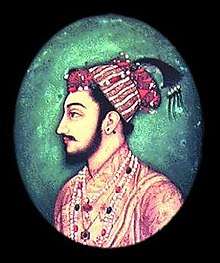Dara Shukoh, also known as Dara Shikoh (20 March 1615 – 30 August 1659), was the eldest son and heir-apparent of the fifth Mughal emperor Shah Jahan. He was favoured as a successor by his father, Shah Jahan, and his older sister, Princess Jahanara Begum, but was defeated and later killed by his younger brother, Prince Muhiuddin (later, the Emperor Aurangzeb), in a bitter struggle for the imperial throne.

Dara Shukoh
Quotes
- Bigger in nature was the protest lodged by the citizens of Delhi when the vanquished Prince Dara Shukoh was humiliated and later executed by Aurangzeb in 1658. Francois Bernier was present in Chandni Chowk and witnessed the event. He writes that “the crowd assembled upon this disgraceful occasion was immense; and everywhere I saw the people weeping and lamenting the fate of Dara.”
- Francois Bernier, quoted from Lal, K. S. (1992). The legacy of Muslim rule in India. New Delhi: Aditya Prakashan. Chapter 6
- When that the impious seed of heresy,
By Akbar nourished, sprang and sprouted fresh
In Dara’s soul, the candle of the heart
Was dimmed in every breast, no more secure
Against corruption our Community
Continued ; then God chose from India
That humble-minded warrior, Alamgir...- Muhammad Iqbal, The Secrets of Selflessness, Emperor Alamgir and the Tiger
- In one of his letters Aurangzeb himself writes: “The fate of Dara Shukoh excited the passions of the misguided citizens of Delhi. They wept in sympathy with him and pelted the loyal Malik Jiwan who had brought him to justice with pots full of urine and excreta.” Royal troops went into action and according to Khafi Khan, “several persons were knocked down and killed and many were wounded… If the Kotwal had not come forward with his policemen, not one of Malik Jiwan’s followers would have escaped with life.”
- Khafi Khan, Muntakhab-ul-Lubab, pp. 245-46. quoted from Lal, K. S. (1992). The legacy of Muslim rule in India. New Delhi: Aditya Prakashan. Chapter 6
- The Hindus' sense of gratitude knows no bounds to Muslim rulers like Zayn al-‘Abidin (1420-70) of Kashmir, ‘Alau d-Din Husayn Shah (1493-1519) of Bengal, and Akbar the Great Mughal, who behaved towards Indians as Indians and at whose hands they could heave a sigh of relief from religious persecution. The three rulers tried their utmost to Indianize their rule and restore the dignity of Hindu community and culture, the latter essaying the uphill task of integrating Islam therewith, followed in this behalf by Prince Dara Shukoh. Who that has even the faintest sense of history can dispute the point that they were all intensely Indian, putting many a Hindu to shame in their patriotic fervour.
- Harsh Narain, Myths of Composite Culture and Equality of Religions (1990)
External links
This article is issued from
Wikiquote.
The text is licensed under Creative
Commons - Attribution - Sharealike.
Additional terms may apply for the media files.